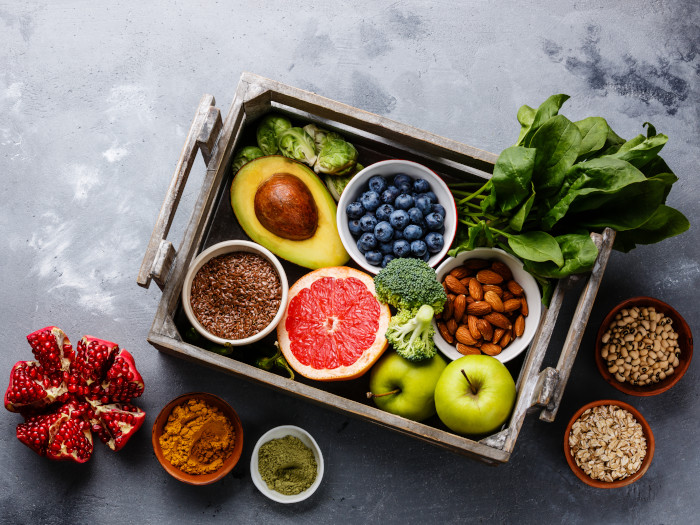Autism affects approximately one in 59 children in the United States, according to the 2018 reports by the Centers for Disease Control and Prevention. Signs of autism usually start to appear in the first year of life. However, because of its complex nature, it can be challenging to diagnose and even more challenging to manage. Multiple studies have looked at the link between autism and food.
There is no specific diet that promises a cure. However, researchers have found certain foods and nutrients that benefit certain symptoms of autism. Let’s take a look at each of these in detail. [1] [2]
A wholesome diet helps you stay healthy. Photo Credit: Shutterstock
Foods for Children with Autism
Doctors suggest that dietary intervention during autism has many benefits for children. So including fatty fish, yogurt, vegetables, fruits, and gluten-free foods in your child’s diet may help provide some benefits.

A wholesome diet helps you stay healthy. Photo Credit: Shutterstock
Omega-3 Fatty Acids
Preliminary research suggests that omega-3 fatty acids can help to improve hyperactivity, lethargy, and stereotypy in children with autism. [3]
The Journal of Pediatric Neurosciences suggests that foods like fish, seafood, eggs, vegetables, and meat products are rich in omega-3 fatty acids. Not only can these foods work to reduce any gut inflammation, but they also contribute to healthy cognitive function. Kids generally like to eat fish so you can make interesting foods like fish fillet with a few vegetables on the side for your little one. [4]
Probiotic-Rich Foods
With the gut-brain connection that is a newer area of study, supporting good digestive health can provide multiple benefits. The link between probiotics and autism is still being studied. As probiotics are good gut bacteria, they play a role in cognitive function as well and can help to normalize gut function. [5] [6]
Probiotics are found in fermented foods such as sauerkraut, yogurt, and pickles as well as others. Although many kids with autism are picky eaters, they like to eat yogurt, so you can top the yogurt with various nuts and fruits to make it healthier.
Prebiotic-Rich Foods
Studies have suggested that prebiotic foods are helpful in autism. Prebiotic foods are foods that feed the good gut bacteria. They are high in soluble fiber which can help with normal gut function. [7]
Foods like bananas, beans, garlic, onions, and peas are prebiotic-rich foods. There are many more foods, so even with a picky eater, you can effortlessly find foods that your child may like to eat.
B6 and Magnesium Foods
A combination of vitamin B6 and magnesium-rich foods helps in improving the symptoms of autism. [8]
Many foods that contain B6 and magnesium include tuna, salmon, fortified breakfast cereals, tofu, legumes, seeds, and bananas. You can add fruits to your junior’s breakfast cereal to make it tasty.
Alternate Grain Products
Although not every child shows a difference with this change, some children notice improvements when they cut gluten-containing products from their diet. Gluten is a protein that’s found in wheat, barley, and rye. Researchers have found that a gluten-free diet may have the potential to alleviate the symptoms of autism. [9] [10]
Gluten-free foods include fruits and vegetables, whole grains like rice, quinoa, millet, and sorghum. On consulting your doctor, you can try these various options with your little one to know which foods benefit the most.
Alternate Dairy Products
Just like gluten can affect some kids with autism, casein can also be a potentially troublesome part of their diet. Casein is a protein that’s found in dairy. It can be linked to behavioral problems, abdominal pain, and other disturbances. Many studies have shown that a casein-free diet may show a ray of hope in treating autism. [11] [12]
If you want to see if this change makes a difference, your best option is to monitor your child’s behavior and health while his/her diet includes cow’s milk products such as milk, dairy-based yogurt, and cheese for a few weeks. If you don’t notice any difference, then you can continue feeding them dairy products. Make sure to consult with your doctor before making any of these changes to your kid’s diet.
Final Thoughts
There are a few takeaways from studies looking at autism and food. The first is that there is a clear connection between the brain and the gut. Supporting physical symptoms through diet can contribute to overall health and reduce the severity of symptoms. Also, it’s recommended to avoid foods that exacerbate physical symptoms. Since dairy and wheat products can cause problems, consider a trial by excluding these foods from your child’s diet to see if any symptoms improve. Although these changes are backed by studies, this doesn’t mean that they will make a difference for every child. Instead, it’s likely that some of these recommendations will benefit your child while others probably won’t make a difference.
Since parenting a child with autism can be overwhelming on its own, start slowly. Incorporate one change at a time and notice any differences. Remember that changes may be slow so it can take a few weeks for you to see the changes happening.
